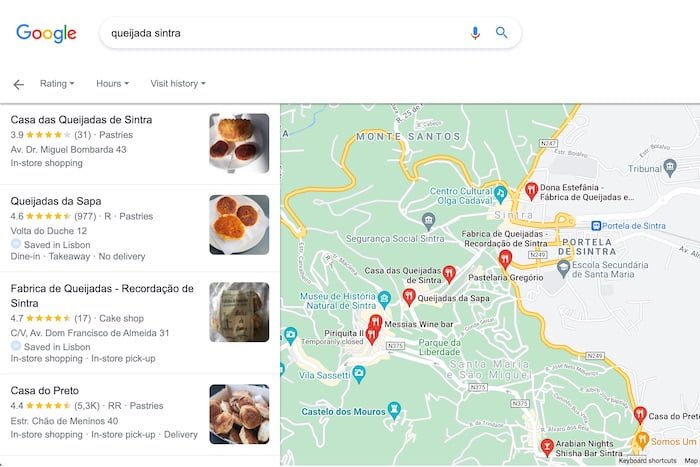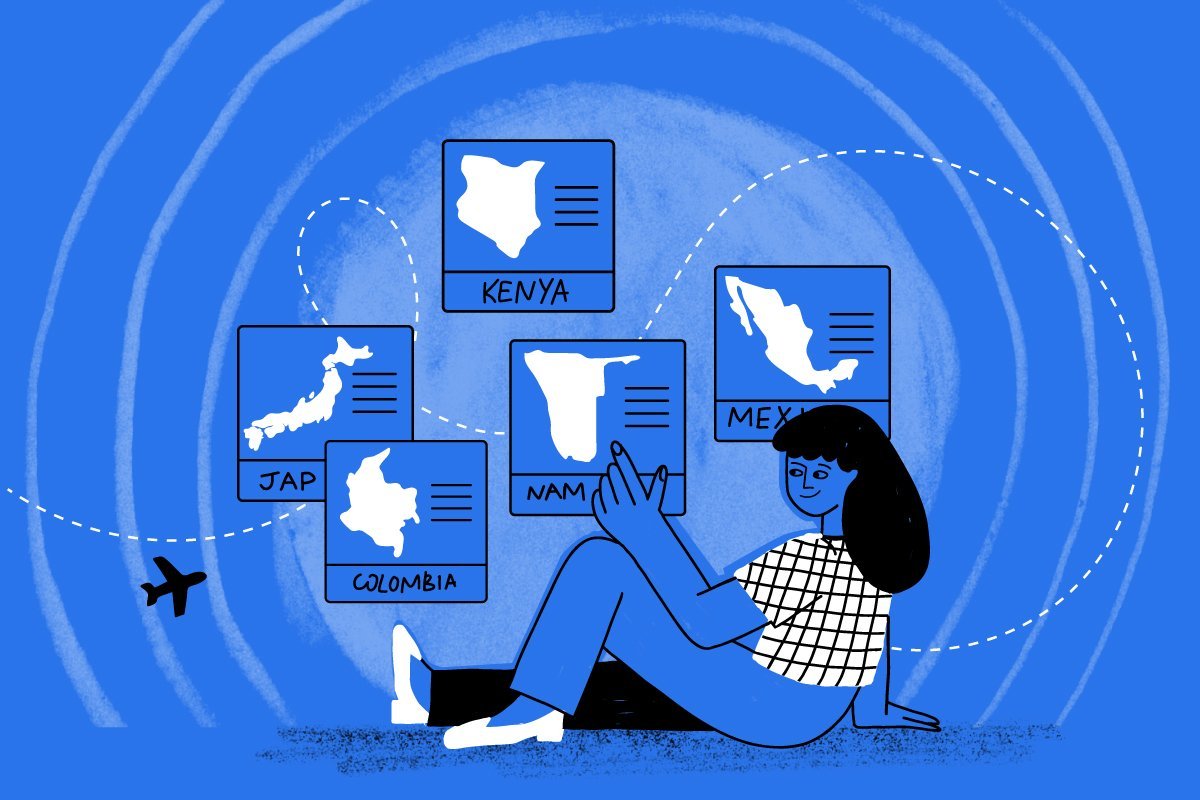This past October, after too many months of being pandemic-ed, Kim and I finally had the chance to travel internationally.
On our way to Cape Town, where we live for half the year, we stopped over in Lisbon for nine days. Our plan was to mostly hang out with our friend Francisco, who lives there, not travel the way we normally do. But, for one day at least, we set out to do some exploring on our own.
Our chosen destination: a fairy-tale-like town half-an-hour outside of Lisbon called Sintra.
Something's Amiss
Excited to brush off my dusty travel planning toolkit, I started the way I always do: by reading a guidebook—in this case, Rick Steves Portugal.
Guidebooks help me get a broad overview and understanding of any destination. And usually they contain clues of lesser-known highlights that I can investigate further online.
Which was step two.
I turned to travel blogs for less-filtered personal insights, opinions, and inspiration. I typed in my go-to starting Google search:

All that search brought before me was a line-up of facsimiles full of info I'd already read in Rick Steves' guide.
Hmmm. On to go-to Google query number two:

Alas, the travel blogs' "off-the-beaten-path" suggestions were the same as the on-the-beaten-path ones.
What the &*$!?
Are the "10 Best Things to Do in Sintra" all the town has to offer?
Unlikely.
Maybe my Google-fu skills had rusted after over a year of travel lockdowns?
Probably.
But I came to realize the bigger problem was with the travel blogs themselves:
Travel blogging has devolved into '90s beauty pageantry.
Humble, Honest Beginnings
Not long ago, when competition was minimal, travel bloggers wrote with unfiltered, unrefined, and un-Photoshopped authenticity.
It was chaotic and amateurish.
Because of this, lots of what you'd find wouldn't be to your taste. But this diversity also helped us all find something that met our fancies or fetishes. And it exposed us to diverse travel perspectives we wouldn't otherwise come across.
Then The Judge Took Over
Everything changed once the judge seized control:
Google.
On the bright side, Google is reasonably unbiased. Any blog can pay to be on top, but then they have to bear a badge that says "Ad." Most audience members are savvy enough to ignore these inorganic winners.
The downside of having Google as judge is that it sets its own criteria for what constitutes a winning travel blog. And, since Google isn't human, those factors are objective. Personality's out of the picture.
Clever travel bloggers quickly picked up on this. Eager for eyeballs, they adjusted their appearance and content to impress Google.
And it worked! Google crowned them, which rewarded them with the lion's share of the audience's attention.
The glamour of being a winning travel blog attracted more and more competitors into the fray. Everyone pushed harder and harder to stand out while still fitting in with Google's criteria. And, to maximize impressions, they sought to appeal to the broadest possible audience.
Everything started looking the same. Beautiful, yes. But also phony.
Selling Out
Travel blogging got worse once big money hit the scene.
As I know first-hand, no well-meaning travel blogger can resist the urge to earn some coin for their efforts.
It's only fair, right?
If I experience some tour, gear, or hotel I really love and send other travelers and their wallets that way, why not earn a small commission?
Nothing wrong with that.
But it rarely stops there.
It's like beauty enhancement. Once you start with a bit of botox, it's hard to turn back. You keep going, replacing the natural and authentic with commission-earning alternatives and selling your soul with sponsored posts. Before you know it, your travel blog's so full of inorganic endorsements you can hardly tell what's real anymore.
Every article ends up looking eerily and disturbingly similar:
- Attention-grabbing, over-the-top titles and text
- Focus on aesthetics over authenticity
- Platitudes and fake cheer in the place of personality and divisive opinion
Travel bloggers not interested in taking part in this beauty contest get buried. They give up or retreat to smaller competitions with different rules, like Pinterest and Reddit.
And travelers hoping for anything other than ditzy blonde bombshell-eque travel blogs are left wanting.

A Peek Behind the Curtains
Am I exaggerating with this beauty pageant analogy?
You bet.
I can't help it. I'm a blogger, after all. Embellishing for attention is what we're trained to do. Hopefully, I've made that clear already.
But I'm not exaggerating as much as you might think.
Come with me behind the curtains to check out this tool called Topic. My ad manager provides it to me to help us make more money.
Here's how Topic works:
- You type a target topic to blog about. E.g., "Sintra things to do."
- Topic's "AI" undresses the top Google results, analyzes their structure, identifies what they all have in common, and tells you exact words and phrases to include in your writing to meet and exceed your competitors' content.

Basically, this tool shows you how to write the same thing as everyone else, only better.
And it works!
It earns bloggers more favor from judge Google…
…which dramatically increase their traffic,
…which earns them more money,
…which bloggers can use for more tools like this and to hire people on UpWork to write more posts like it without even having to visit the destinations they're covering.
What's a Traveler to Do?
In the case of our trip to Sintra, I gave up on trying to find raw, rough edges amongst the diamond-polished, gold-digging travel blogs.
Instead, Kim and I winged it.
We borrowed Francisco's car, parked it in the first spot we could find, and wandered in and around town. We had no particular "must-see" or "can't-miss" destinations on our itinerary.
In some ways, it was old-school, pre-internet travel.
In other ways, it wasn't because we whipped out our phones to scan Google Maps for restaurants, cafés, or bakeries that looked to be our taste.
A handful of places had "queijada" in their name, so we looked up what it meant. Queijadas turned out to be a local specialty—a type of milk tart.
This was it! A plan:

We set a wandering route to explore Sintra from one queijaderia to the next.
Unfortunately, most of the queijaderias turned out to be closed on the Monday we visited.
But all wasn't lost:
Our improvised plan got us going down side streets and through botanical gardens that gave us our own authentic feel for Sintra. And call it sour grapes, but queijadas didn't turn out to be that tasty, anyway.
Our day trip to Sintra wasn't the most beautiful. It didn't include any of the "Top 10" features. But at least it had personality.
Will the Pageantry Ever End?
Since the '90s, it seems that beauty pageants have gotten more diverse. Hopefully the same will happen to travel blogs in the coming years.
Ultimately, the audience decides.
The more travelers go online in search of authenticity and diversity, as opposed to beauty and "the best," the more Google will adjust its judging criteria accordingly. If so, I suppose the future of travel blogging will go back to being more like it was in the past.
But I fear the opposite will happen:
Instead of having real people behind travel blogs, artificial intelligence becomes so good at decoding our individual tastes that it can generate content that looks real and is exactly what we're looking for. A beauty pageant of robots.
Or maybe a third outcome:
Like Kim and I did in Sintra, more and more travelers will give up on travel blogs and go back to something closer to the pre-blog era of books, paper maps, word-of-mouth, and getting lost.
Come to think of it, that wouldn't be so bad.




I absolutely agree. My former favorite travel blogs used to follow a generally similar format–they'd tell you where they went/what they did, what they honestly thought of it, and include basic logistical info. They also weren't afraid to share personal stories, which made them even more interesting! Far too many of them now publish nothing but the "Top Ten" lists. I really miss their personal observations and stories of funny/sad/interesting interactions with locals, travel mishaps, etc.
You guys have such a great open, honest style, and always provide useful information –your posts are a pleasure to read!
Thanks, Carla. I wonder if your former favorite travel bloggers also miss the "good ol' days"? I suspect, so, though they probably wouldn't want to lose the earnings and perks they get from being more mainstream.
Hi Carla,
Thanks for your input and I completely agree with your point of view. The personal side of a blog is so important, that is why you go to a blog instead of a travel guide book, right? I am just starting my travel blog and this is definitely something to keep in mind!
I have a travel blog myself. One I've almost given up on, as those games you described above have taken over what's left of the field. Yeah, I do some SEO and such, we all do, but no way can I go too much further into crafting sentences like the Topic tool describes. Depressing, reading about that. Thanks for showing the soft underbelly.